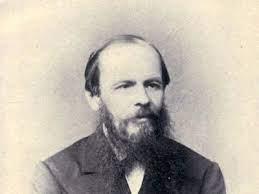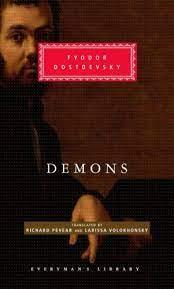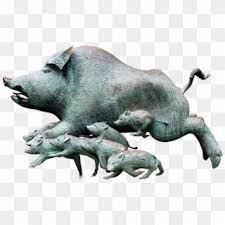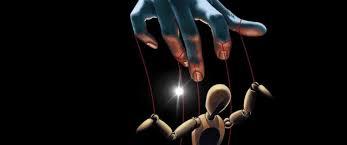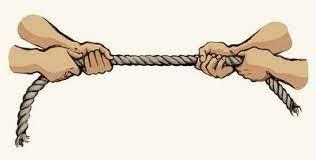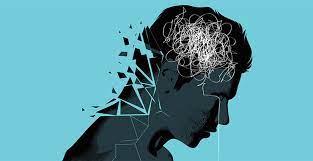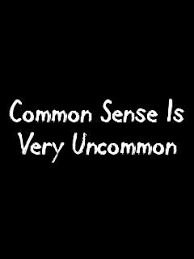Demons (Dostoevsky novel) - Wikipedia
Curated from: en.m.wikipedia.org
Ideas, facts & insights covering these topics:
9 ideas
·1.18K reads
5
Explore the World's Best Ideas
Join today and uncover 100+ curated journeys from 50+ topics. Unlock access to our mobile app with extensive features.
Fyodor Dostoevsky
Fyodor Mikhailovich Dostoevsky 1821 – 1881), sometimes transliterated as Dostoyevsky, was a Russian novelist, short story writer, essayist, and journalist. Dostoevsky's literary works explore the human condition in the troubled political, social, and spiritual atmospheres of 19th-century Russia, and engage with a variety of philosophical and religious themes.
9
194 reads
Demons (Dostoevsky novel)
Demons (sometimes also called The Possessed or The Devils) is a novel by Fyodor
Dostoevsky. Demons is a social and political satire, a psychological drama, and large-scale tragedy. The novel was first published in 1873.
“People who can speak well, speak briefly.”
-Fyodor Dostoyevsky, Demons
10
184 reads
Demons as allegory
Demons is an allegory of the potentially catastrophic consequences of the political and moral nihilism that were becoming prevalent in Russia in the 1860s.
It’s a fictional town that descends into chaos as it becomes the focal point of an attempted revolution. The underlying allegorical context is about "demonic" forces that take possession of the town.
9
150 reads
Meaning of the term “Demons”
“Demons” in this sense refers not so much to individuals as to the ideas that possess them. For Dostoevsky, 'ideas' are living cultural forces that have the capacity to seduce and subordinate the individual consciousness, and the individual who has become alienated from his own concrete national traditions is particularly susceptible.
10
139 reads
Background of Demons
In late 1860s Russia there was an unusual level of political unrest caused by student groups influenced by liberal, socialist, and revolutionary ideas. Dostoevsky offers commentary on the relationship of the ideas of his own generation to those of the current generation.
8
130 reads
Themes
Themes
Much of the plot develops out of the tension between belief and non-belief, and the words and actions of most of the characters seem to be intimately bound to the position they take up within this struggle.
Dostoevsky saw atheism as the root cause of Russia's deepening social problems.
In Demons the Russian man has lost his true national identity (inextricably linked, for Dostoevsky, with the Orthodox Christian faith) and tries to fill the void with ideas derived from Western modes of thought.
8
95 reads
Suicide
Dostoevsky saw Russia's growing suicide rate as a symptom of the decline of religious faith and the concomitant disintegration of social institutions like the family. Self-destruction as a result of atheism or loss of faith is a major theme in Demons.
There are four actual suicides described in the novel.
8
99 reads
Demons as satire and Prophecy
Demons as satire
Dostoevsky took great pains to derive the novel's characters and story from real people and real ideas of the time.
As prophecy
Since the Russian Revolution, many commentators have remarked on the prophetic nature of Demons.
8
85 reads
Quote from the Novel
“One must be a great man indeed to be able to hold out even against common sense. Or else a fool.”
-Fyodor Dostoyevsky, Demons
9
110 reads
IDEAS CURATED BY
CURATOR'S NOTE
Demons by Fyodor Dostoevsky
“
Tom Joad's ideas are part of this journey:
Learn more about communication with this collection
The importance of practice and repetition in learning
How to stay motivated and avoid burnout while learning
How to break down complex concepts into manageable parts
Related collections
Similar ideas
14 ideas
The Macbeth Witches
rantsartliterature.wordpress.com
1 idea
Caesar's civil war - Wikipedia
en.wikipedia.org
2 ideas
Paranoid Narcissism: What Dostoevsky Knew About the Internet
theamericanreader.com
Read & Learn
20x Faster
without
deepstash
with
deepstash
with
deepstash
Personalized microlearning
—
100+ Learning Journeys
—
Access to 200,000+ ideas
—
Access to the mobile app
—
Unlimited idea saving
—
—
Unlimited history
—
—
Unlimited listening to ideas
—
—
Downloading & offline access
—
—
Supercharge your mind with one idea per day
Enter your email and spend 1 minute every day to learn something new.
I agree to receive email updates

